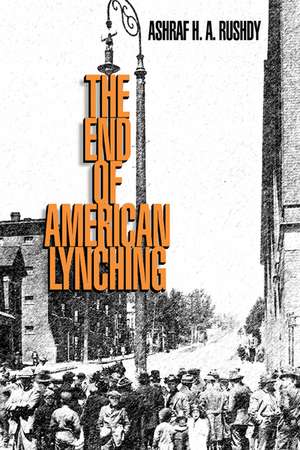The End of American Lynching
Autor Ashraf H. A. Rushdyen Limba Engleză Paperback – 18 iun 2012
The End of American Lynching questions how we think about the dynamics of lynching, what lynchings mean to the society in which they occur, how lynching is defined, and the circumstances that lead to lynching. Ashraf H. A. Rushdy looks at three lynchings over the course of the twentieth century—one in Coatesville, Pennsylvania, in 1911, one in Marion, Indiana, in 1930, and one in Jasper, Texas, in 1998—to see how Americans developed two distinct ways of thinking and talking about this act before and after the 1930s.
One way takes seriously the legal and moral concept of complicity as a way to understand the dynamics of a lynching; this way of thinking can give us new perceptions into the meaning of mobs and the lynching photographs in which we find them. Another way, which developed in the 1940s and continues to influence us today, uses a strategy of denial to claim that lynchings have ended. Rushdy examines how the denial of lynching emerged and developed, providing insight into how and why we talk about lynching the way we do at the dawn of the twenty-first century. In doing so, he forces us to confront our responsibilities as American citizens and as human beings.
One way takes seriously the legal and moral concept of complicity as a way to understand the dynamics of a lynching; this way of thinking can give us new perceptions into the meaning of mobs and the lynching photographs in which we find them. Another way, which developed in the 1940s and continues to influence us today, uses a strategy of denial to claim that lynchings have ended. Rushdy examines how the denial of lynching emerged and developed, providing insight into how and why we talk about lynching the way we do at the dawn of the twenty-first century. In doing so, he forces us to confront our responsibilities as American citizens and as human beings.
Preț: 192.15 lei
Preț vechi: 268.05 lei
-28% Nou
Puncte Express: 288
Preț estimativ în valută:
36.77€ • 39.93$ • 30.89£
36.77€ • 39.93$ • 30.89£
Carte indisponibilă temporar
Doresc să fiu notificat când acest titlu va fi disponibil:
Se trimite...
Preluare comenzi: 021 569.72.76
Specificații
ISBN-13: 9780813552927
ISBN-10: 0813552923
Pagini: 232
Ilustrații: 2 photographs
Dimensiuni: 152 x 229 x 15 mm
Greutate: 0.37 kg
Ediția:None
Editura: Rutgers University Press
Colecția Rutgers University Press
ISBN-10: 0813552923
Pagini: 232
Ilustrații: 2 photographs
Dimensiuni: 152 x 229 x 15 mm
Greutate: 0.37 kg
Ediția:None
Editura: Rutgers University Press
Colecția Rutgers University Press
Notă biografică
ASHRAF H. A. RUSHDY teaches in the African American studies program and the English department at Wesleyan University. He is the author of The Empty Garden: The Subject of Late Milton, Neo-Slave Narratives: The Social Logic of a Literary Form, and Remembering Generations: Race and Family in Contemporary African American Literature.
Cuprins
Contents
Preface
Acknowledgments
Introduction: When Is an American Lynching?
1 The Accountant and the Opera House
2 Date Night in the Courthouse Square
3 The End of American Lynching
4 The Last American Lynching
Conclusion: The Subject of Lynching
Notes
Index
Acknowledgments
Introduction: When Is an American Lynching?
1 The Accountant and the Opera House
2 Date Night in the Courthouse Square
3 The End of American Lynching
4 The Last American Lynching
Conclusion: The Subject of Lynching
Notes
Index
Recenzii
"Both excellent and unique, The End of American Lynching offers a sophisticated yet clear and methodical approach to the study of lynching...fresh, distinct, and eminently readable."
"Written with vigor and in sprightly prose, in this provocative book Rushdy adds much-needed subtlety to the contemporary ‘end of racism’ debate while clarifying why so many Americans misunderstood or denied the reality of lynching for so long."
"The End of American Lynching, Ashraf H. A. Rushdy’s important examination of lynching discourse, asks scholars to reconsider how they
remember and talk about racial violence."
remember and talk about racial violence."
Descriere
The End of American Lynching questions how we think about the dynamics of lynching, what lynchings mean to the society in which they occur, how lynching is defined, and the circumstances that lead to lynching. Ashraf H. A. Rushday looks at three lynchings over the course of the twentieth century—one in Coatesville, Pennsylvania in 1911, one in Marion, Indiana in 1930, and one in Jasper, Texas in 1998—to see how Americans developed two distinct ways of thinking and talking about this act before and after the 1930s.
